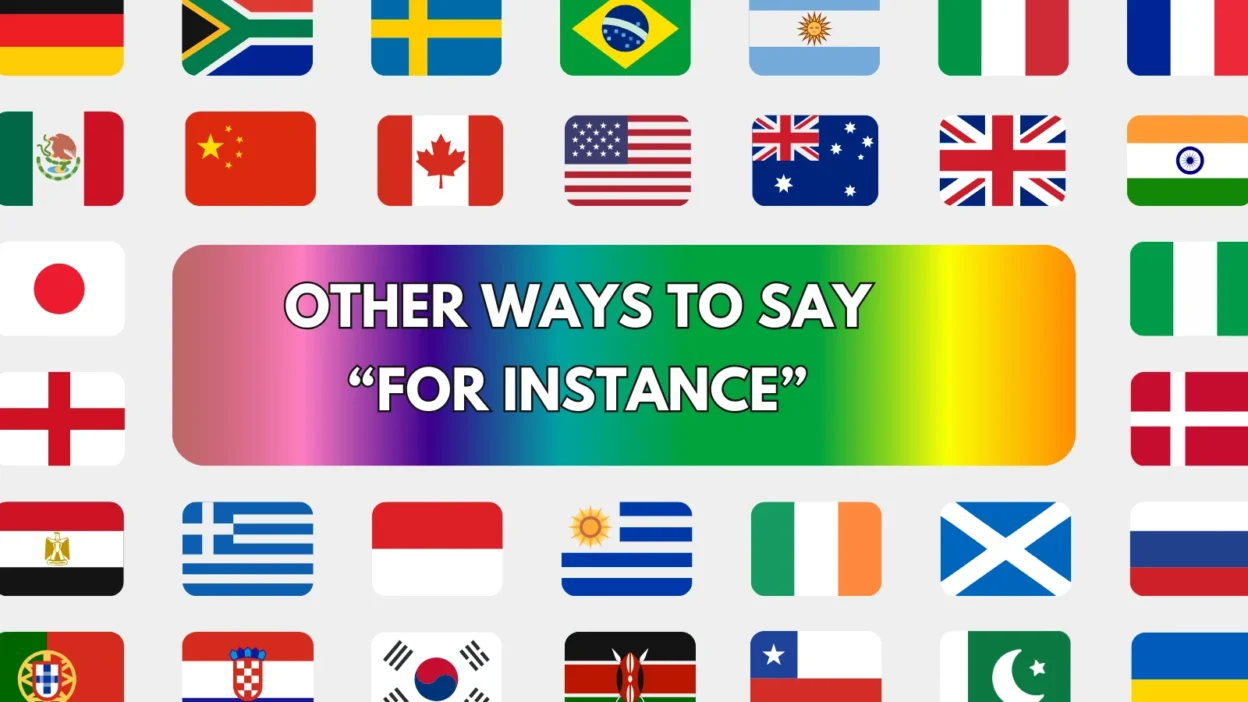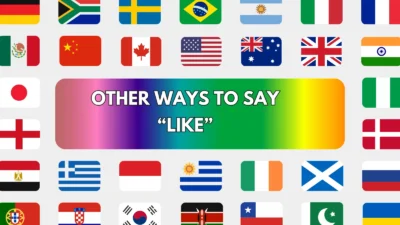The phrase “for instance” is widely used to introduce examples in essays, conversations, reports, or instructions. It helps clarify a point by giving a specific situation or item. However, overusing it can make your writing repetitive. Whether you’re working on an academic paper, email, or article, using alternatives to “for instance” will make your writing more dynamic and polished.
Here are 25 great ways to say “for instance”, each explained with examples and usage tips.
1. For Example
Meaning
Used to introduce a specific illustration or case.
Detailed Explanation
This is the most direct and common alternative to “for instance.” It’s versatile and suitable for most forms of writing or speech.
Scenario Example
Many fruits are rich in vitamins. For example, oranges are high in vitamin C.
Best Use
Academic writing, essays, general conversation.
Tone
Neutral, clear.
2. Such As
Meaning
Introduces specific items or cases as part of a group.
Detailed Explanation
This phrase often comes in the middle of a sentence to list examples that support a point.
Scenario Example
He enjoys outdoor activities, such as hiking, camping, and biking.
Best Use
Writing lists, descriptive content.
Tone
Informative, explanatory.
3. Namely
Meaning
Specifically identifying something that has been mentioned.
Detailed Explanation
“Namely” narrows the focus and identifies exact examples, making it slightly more formal.
Scenario Example
Three employees were promoted, namely, John, Priya, and Hassan.
Best Use
Formal writing, detailed explanations.
Tone
Precise, scholarly.
4. To Illustrate
Meaning
Used before an example to show or explain something clearly.
Detailed Explanation
A more academic way to introduce examples, especially in essays or reports.
Scenario Example
To illustrate, let’s consider how inflation affects daily expenses.
Best Use
Essays, lectures, formal communication.
Tone
Educational, clear.
5. Like
Meaning
Gives examples or comparisons.
Detailed Explanation
More casual than “such as,” commonly used in spoken English.
Scenario Example
I enjoy classic authors like Jane Austen and Charles Dickens.
Best Use
Casual writing, conversation.
Tone
Relaxed, informal.
6. In Particular
Meaning
Highlights a specific part of a group.
Detailed Explanation
Used to emphasize a certain detail or example out of many.
Scenario Example
I love historical fiction, in particular, novels set during the Victorian era.
Best Use
Descriptive writing, highlighting a point.
Tone
Focused, slightly formal.
7. Especially
Meaning
To single out one or more elements from a group.
Detailed Explanation
This word often adds emotional emphasis to the example given.
Scenario Example
I love reading, especially mysteries and thrillers.
Best Use
Creative writing, opinion statements.
Tone
Emphatic, expressive.
8. Take…for Example
Meaning
Used to introduce a concrete example.
Detailed Explanation
Adds a conversational tone and flows well in spoken English.
Scenario Example
Take social media, for example—it changed how we communicate.
Best Use
Presentations, friendly explanations.
Tone
Approachable, illustrative.
9. Say
Meaning
Used casually to present an example or possibility.
Detailed Explanation
Informal, often used in conversation to illustrate hypothetical examples.
Scenario Example
If you were, say, a teacher, you’d understand the pressure.
Best Use
Casual speech, storytelling.
Tone
Relaxed, conversational.
10. Including
Meaning
Introduces examples within a broader statement.
Detailed Explanation
Often used when examples are part of a larger list or category.
Scenario Example
She has visited many countries, including Japan, Brazil, and Kenya.
Best Use
Informative content, travel writing, lists.
Tone
Neutral, practical.
11. As an Example
Meaning
Introducing a sample case to clarify a point.
Detailed Explanation
Similar to “for example,” but slightly more structured.
Scenario Example
As an example, consider how renewable energy reduces pollution.
Best Use
Expository essays, reports.
Tone
Clear, professional.
12. Let’s Say
Meaning
Used to introduce a hypothetical or illustrative example.
Detailed Explanation
Good for making theoretical points easier to understand.
Scenario Example
Let’s say you earn $500 a week—how would you budget it?
Best Use
Explanations, teaching, casual dialogue.
Tone
Interactive, informal.
13. To Give You an Idea
Meaning
Offers a concrete example to clarify or visualize a concept.
Detailed Explanation
Often used to introduce statistics or relatable visuals.
Scenario Example
To give you an idea, our warehouse holds over 100,000 units.
Best Use
Presentations, business talks.
Tone
Explanatory, relatable.
14. By Way of Example
Meaning
Formally introduces an example to support an idea.
Detailed Explanation
Less common but useful in structured or formal writing.
Scenario Example
By way of example, let’s analyze the company’s growth in Asia.
Best Use
Academic writing, professional reports.
Tone
Formal, academic.
15. Consider
Meaning
Invites the reader or listener to reflect on a specific case.
Detailed Explanation
This rhetorical device adds authority to your point.
Scenario Example
Consider the impact of automation on small businesses.
Best Use
Persuasive writing, opinion essays.
Tone
Engaging, thoughtful.
16. Suppose
Meaning
Used to introduce a scenario or possibility.
Detailed Explanation
Adds a sense of imagination or hypothetical reasoning.
Scenario Example
Suppose you had to live without the internet—what would change?
Best Use
Debates, speculative writing.
Tone
Hypothetical, curious.
17. For Illustration
Meaning
Used to visually or clearly explain an idea.
Detailed Explanation
Similar to “to illustrate,” typically used in educational settings.
Scenario Example
For illustration, imagine a graph showing global temperature change.
Best Use
Teaching, formal presentations.
Tone
Academic, instructive.
18. Imagine
Meaning
Helps the audience picture an example vividly.
Detailed Explanation
Great for engaging storytelling or persuasive writing.
Scenario Example
Imagine a world where clean water is available to everyone.
Best Use
Creative writing, motivational speaking.
Tone
Vivid, inspiring.
19. One Case Is
Meaning
Introduces a particular example from a larger context.
Detailed Explanation
Helpful when referencing studies, stories, or individual situations.
Scenario Example
One case is the recent policy change in California.
Best Use
Case studies, research writing.
Tone
Professional, specific.
20. A Good Example Would Be
Meaning
Shows a clear example to illustrate the point.
Detailed Explanation
Makes the transition to an example smooth and natural.
Scenario Example
A good example would be how startups handle customer feedback.
Best Use
Explanatory writing, discussions.
Tone
Clear, conversational.
21. A Classic Example
Meaning
Refers to a well-known or widely accepted example.
Detailed Explanation
Often used when referring to textbook or historical instances.
Scenario Example
A classic example is Newton’s law of motion.
Best Use
Science, history, education.
Tone
Authoritative, academic.
22. A Typical Example
Meaning
Highlights a common or representative case.
Detailed Explanation
Used to explain a general point through an average instance.
Scenario Example
A typical example of time management failure is missing deadlines.
Best Use
Workshops, how-to articles.
Tone
Neutral, instructive.
23. An Example That Comes to Mind
Meaning
Refers to a spontaneous or immediate example.
Detailed Explanation
Adds a personal or thoughtful tone.
Scenario Example
An example that comes to mind is when we launched our first app.
Best Use
Speech, personal storytelling.
Tone
Reflective, relatable.
24. Like When
Meaning
Introduces an example in a casual, story-driven way.
Detailed Explanation
Often used in conversations to make a comparison through events.
Scenario Example
Like when we missed our flight because of a traffic jam.
Best Use
Dialogue, informal writing.
Tone
Personal, relaxed.
25. In One Instance
Meaning
Points to a single example among others.
Detailed Explanation
This is helpful when giving detailed case-based evidence.
Scenario Example
In one instance, the system crashed after a routine update.
Best Use
Reports, incident logs, support explanations.
Tone
Technical, factual.
Conclusion
Saying “for instance” is helpful, but using it too often can weaken your writing or speaking flow.
With these 25 clear and powerful alternatives, you’ll be able to vary your language, better engage your audience, and tailor your tone for every situation—from casual chats to academic reports.

Hadi Bhatti is a passionate writer and content creator at Saypadia, known for turning complex words, phrases, and internet slang into simple, easy-to-understand explanations. With a strong interest in language, meanings, and digital communication, Hadi focuses on helping readers understand what words really mean in everyday use. His writing style is clear, engaging, and user-focused, making learning both practical and enjoyable.




